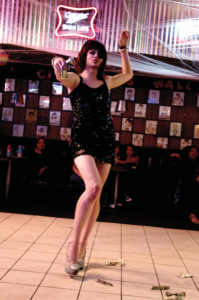A story of unexpected conversions from missionary to drag queen.

Lights come up on a towering figure, his back to the audience. Standing in high heels, he might be seven feet tall. Dressed in a short black slip, he is all leg. He stretches his arms up and reveals even more leg. A breathy voice sings over spare drums and bass. It’s a song by Portishead.
I’m so tired, of playing
Playing with this bow and arrow
Gonna give my heart away
He turns and begins to dance. The electric guitar moans. The audience screams. One man throws himself on the floor at the feet of the performer, a dollar bill in his mouth.
I am in Provo, Utah: land of Mormons, home of Brigham Young University where cross-dressing and same-sex dating are prohibited in the honor code. For Mormons, it’s taboo even to set foot in a bar, let alone a bar with a drag show. But every other Friday night, the Divine Sister-Misters of Utah County take the stage at the City Limits Tavern.
Later, outside the bar, the performer John Taylor Adams, stage name Brigitte Kiss, introduces himself. Adams grew up Mormon. He even served a church mission in Washington state. His relationship with religion is complicated. He’s traded in the missionary white shirt and tie for a black slip and heels, but his name is still on the church rolls. Adams says he started dressing in drag at a time when he was severely depressed.

“I would just do it in my room, and lip sync in the mirror,” he said. “Then I would feel better and I could go about my day.”
Eventually it became something he shared with others.
“I do think that we’re tapping into something that people need here. For me, I would call it expression,” he said. “Everyone has a need to express themselves, and we’ve found this place where this group of people can come together and feel that. Being a mile from BYU and blocks down from the temple, it’s a really cool experience. I love it.”
For some performers, this kind of expression means some major life changes. Aaron Speer was going to BYU when he came out as gay and started performing in drag. He decided to transfer to Utah Valley University.
“I couldn’t keep going to BYU and do drag and date, and live the life that I wanted to because of their honor code there, but I needed to do what was best for me,” Speer said. “I loved BYU, I had a really good time there, but also I like being a woman on the weekends.”
Every year in late summer, there is a drag queen pageant in Provo. Last year, Speer was named Miss Mollier Than Thou, a runner-up to Righteous Miss Provo. Speer says the drag scene provides a support network for Utah County’s LGBT community.
“It makes me feel so good,” he said. “I think we’ve all come from a difficult background, and so there’s maybe a lot more community here than other places when it comes to drag.”
There is one female performer in the troupe. Cassandra Rominger describes what she does as gender-bending drag. Rominger is dressed like a man; she has comical orange chest hair coming out from under her shirt with matching side burns on her face, but she’s also stuffed her bra and added fake eyelashes. She’s an unlikely drag performer. Rominger is heterosexual and she has severe anxiety about performing in public.
“I don’t know why I do this because I have a panic attack every time I perform,” Rominger said. She’s here because she has a younger brother who is gay.
“I watched him in his 20s come out of the closet and go back into the closet. He voluntarily put himself in conversion therapy,” she said. Rominger was worried he might take his own life. “It was horrific to watch my brother nearly die.”
Rominger says she performs in drag to send a message to those out there like her brother: “It’s okay to be you, and you don’t have to be different because you are wonderful and beautiful just the way you are.”
Overseeing the show is James Bunker, president of Provo Pride. His stage name is Jackie Ohh Starr, but he’s known within the troupe as Mom.
“On a drag night, I feel like a proud mom with all of my performers up on stage, entertaining, doing what they love.”
Bunker says the troupe is carrying on a role pioneered by drag queens decades ago.
“Drag queens helped start the gay movement back in the ’70s with the Stonewall riots,” he said. “Drag queens are an integral part of the LGBT community because of that and because of the way we push the gender norms.”
Bunker says the job of a drag queen is to push the envelope, and the Divine Sister-Misters will be back every other Friday to play that role in Provo. Bunker says many of his LGBT friends have left the area, but there’s no place he would rather be.
“There aren’t very many of us who grow up and stay here,” he said. “I think that it means more to me to perform drag in Provo than anywhere else I’ve performed because I grew up here. It just feels amazing. It feels like we’re making a difference and changing things.”
Andrea Smardon is the host and executive producer of Changing Our Stories, a new podcast based in Utah about people in transformation. This story is adapted from a podcast episode available at changingourstories.org
